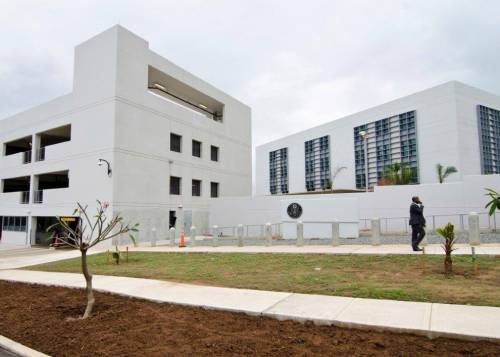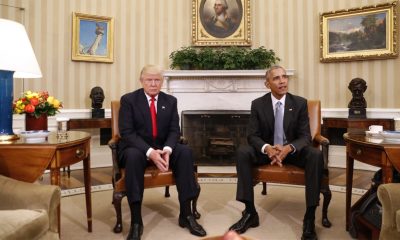International
Netanyahu faces delicate balancing act in US after Biden exits race

Netanyahu faces delicate balancing act in US after Biden exits race
Israeli Prime Minister Benjamin Netanyahu visits the US this week under pressure to end the Gaza war, from both Israelis and the US administration. How might the political turbulence in Washington shape the trip and future relations?
Mr Netanyahu is set to meet Joe Biden – if the president has recovered from Covid-19 – and address a joint session of Congress, the only foreign leader to do so for a fourth time.
The trip offers him a platform for a reset with Washington after months of tensions over his hardline approach to the war, and an opportunity to try and convince Israelis that he hasn’t undermined relations with their most important ally.
But it is overshadowed by President Biden’s decision not to seek re-election, highlighting political uncertainties about Israel’s next partner in the White House and possibly eclipsing some of the attention on Mr Netanyahu’s visit.
The prime minister got a lot of unwelcome attention in Israel until the moment he boarded the plane.
A drumbeat of protests demanded that he stay home and focus on a ceasefire deal with Hamas to free Israeli hostages.
“Until he has signed the deal that’s on the table, I do not see how he picks up and flies across the Atlantic to address the American political chaos,” said Lee Siegel, one of the family members who has come out to demonstrate. His 65-year-old brother Keith is a captive in Gaza.
The trip is a political move, he added, unless Mr Netanyahu stops being a “hurdle” and signs the ceasefire agreement.
Mr Siegel reflected a widespread view that Mr Netanyahu is slow-rolling the process for his own political reasons, roiling his negotiators when he recently threw new conditions into talks that seemed to be making progress.
The prime minister has been accused of bowing to pressure from two far-right cabinet ministers who’ve threatened to bring down his government if he makes concessions to Hamas.
These perceptions have added to frustrations in the White House, which announced the latest formula for talks and had been expressing optimism an agreement could be achieved.
READ ALSO:
- Biden’s legacy is Gaza genocide, Palestinian rights advocates say
- Why some people in NNPC are sabotaging Dangote refinery – Emir Sanusi
- Dozens killed as Palestinians flee Israel’s new offensive on Khan Younis
Mr Biden remains one of the most pro-Israel presidents to sit in the Oval Office, a self-declared Zionist who’s been lauded by Israelis for his support and empathy, cemented by his flight to Israel just days after the Hamas attacks on 7 October.
But since then, he’s grown alarmed at the cost of Mr Netanyahu’s demand for a “total victory” against Hamas in Gaza.
The administration is frustrated with the Israeli prime minister for rejecting a post war solution that involves pursuing a Palestinian state.
It’s angry with him for resisting appeals to do more to protect Palestinian civilians and increase the flow of aid to them. It’s facing a domestic backlash over the mounting death toll in Gaza. And it’s worried that the conflict is spreading to the region.
As Joe Biden’s presidency weakened in the swirl of controversy over his abilities, analysts said there might be less room for him to keep up the pressure on the Israeli prime minister.
But Mr Biden’s decision to drop out of the race could actually have strengthened his hand, says Ehud Barak, a former Israeli prime minister and a critic of Mr Netanyahu.
“He is not a lame duck in regard to foreign policy, in a way he’s more independent (because) he doesn’t have to take into account any impact on the voters,” Mr Barak told the BBC.
“With regard to Israel probably he feels more of a free hand to do what really needs to be done.”
Mr Barak believes it was a mistake for Congress to invite Mr Netanyahu to speak, saying that many Israelis blame him for policy failures that allowed the Hamas attack to happen, and three out of four want him to resign.
“The man does not represent Israel,” he said. “He lost the trust of Israelis…And it kind of sends a wrong signal to Israelis, probably a wrong signal to Netanyahu himself, when the American Congress invites him to appear as if he is saving us.”
Whatever politics he may be playing, Mr Netanyahu insists military pressure must continue because it has significantly weakened Hamas after a series of strikes against the military leadership.
READ ALSO:
- Ekiti council worker arrested, accused of sleeping with teenage daughter
- I’ll divorce my wife if Kamala doesn’t win US presidential election – Charly Boy
- Lagos traditional ruler who faked his abduction gets jail term reduction
In comments before departing Israel, he suggested that would be the tone of his meeting with President Biden.
“It will also be an opportunity to discuss with him how to advance in the months ahead the goals that are important for both our countries,” he said, “achieving the release of all our hostages, defeating Hamas, confronting the terror axis of Iran and its proxies and ensuring that all Israel’s citizens return safely to their homes in the north and in the south.”
He’s expected to bring the same message to congress, “seeking to anchor the bipartisan support that is so important to Israel”.
The reality is that Mr Netanyahu’s polices have fractured that bipartisan support. The Republicans are rallying around him, but criticism from Democrats has grown.
The Democratic Senate Majority leader Chuck Schumer caused a small earthquake in Washington recently when he stood up in the chambers and said Mr Netanyahu was one of the obstacles standing in the way of a lasting peace with Palestinians.
“I hope the prime minister understands the anxiety of many members in congress and addresses them,” the former US ambassador to Israel, Thomas Nides, told the BBC at the weekend. He’d been addressing one of the many rallies demanding a hostage release.
That includes “on humanitarian issues and to articulate that this fight isn’t with the Palestinian people, it’s with Hamas.”
It’s a message that Kamala Harris would repeat if she were to become the Democratic nominee. There’d be no change in US policy: a commitment to Israel’s security while pushing for an end to the Gaza conflict and a plan for the Day After embedded in a regional peace with Arab states.
READ ALSO:
- Ondo state police rescue kidnapped corps members
- Another Chibok girl rescued with two children
- Reps probe missing crude, contaminated fuel
But there might be a difference in tone.
Ms Harris does not share Mr Biden’s long history with and emotional ties to Israel. She’s from a different generation and “could more closely align with the sentiments of younger elements of the Democratic party,” says Mick Mulroy, a former deputy assistant secretary of defence for the Middle East.
“That’s a stance more likely to include restrictions on weapons, on munitions from the United States for use in Gaza,” he said.
Mr Netanyahu could very well use the visit to steer the conversation from the controversy over Gaza to the threat from Iran, a topic with which he’s far more comfortable, especially after the recent escalation with Iran-backed Houthi rebels in Yemen.
But his main audience will be domestic, says Tal Shalev, the diplomatic correspondent at Israel’s Walla News.
He wants to revive his image as “Mr America,” she says, the man who can best present Israel to the US, and to restore his image which was shattered by the October 7 attacks.
“When he goes to the US and speaks in front of Congress and [has] a meeting in the White House, for his electoral base, it’s the old Bibi is back again,” she says, referring to the prime minister by his nickname. “This is not the failed Bibi who was responsible for the seventh of October. This is the old Bibi who goes to the Congress and gets the standing ovations.”
It also gives him an opportunity to pursue connections with the former President Donald Trump at a time of great political flux in Washington.
“Netanyahu wants President Trump to win,” she says, “And he wants to make sure that he and President Trump are on good terms before the election.”
There is a widespread view that Mr. Netanyahu is playing for time, hoping for a Trump win that might ease some of the pressure he’s been facing from the Biden administration.
“There is a near-universal perception that Netanyahu is eager for a Trump victory, under the assumption that he will then be able to do whatever he wants,” writes Michael Koplow of Israel’s Policy Forum.
“No Biden pressuring him on a ceasefire or on West Bank settlements and settler violence… There are many reasons to doubt this reading of the landscape under a Trump restoration, but Netanyahu likely subscribes to it.”
The question is whether that pressure from Biden will ease as he steps away from the presidential race, or whether he will in fact use his remaining months in office to focus on achieving an end to the Gaza war.
Netanyahu faces delicate balancing act in US after Biden exits race
BBC
International
Trump mulls closure of US embassies in Africa

Trump mulls closure of US embassies in Africa
The Trump administration is reportedly considering shutting down nearly 30 embassies and consulates worldwide—including several in Africa—as part of a broader plan to streamline America’s diplomatic presence abroad.
This is according to an internal document from the US State Department, obtained by CNN.
Among the proposed closures are American embassies in Lesotho, the Republic of Congo, the Central African Republic, and South Sudan.
A consulate in South Africa is also listed for potential shutdown.
READ ALSO:
- Breaking: Virgil van Dijk signs new contract at Liverpool
- Bayelsa lawmaker, Wike’s ally exchange blows amid tension over scheduled event [VIDEO]
- How Obasanjo, Jonathan, Buhari paid lip service to power sector – Minister
These developments come amid a sweeping attempt by the administration to shrink the size of the US federal government, with influence from the Elon Musk-backed Department of Government Efficiency.
In total, the document recommends closing 10 embassies and 17 consulates around the globe, including missions in Europe, Asia, and the Caribbean.
Africa, however, features prominently on the list—raising concerns about the potential diplomatic and developmental fallout for the continent.
While it’s unclear whether US Secretary of State Marco Rubio has approved the recommendations, the document indicates that American diplomatic operations in affected countries would be consolidated into neighboring nations’ missions.
Trump mulls closure of US embassies in Africa
International
Titanic: Found ladies watch for auction at £50,000

Titanic: Found ladies watch for auction at £50,000
A lady’s pocket watch discovered among the belongings of one of the passengers who drowned on the Titanic’s doomed maiden voyage could fetch up to 50,000 euros (66,000 dollars) at auction.
Hans Christensen Givard, a 27-year-old Danish second-class passenger, was one of 1,500 people killed when the ship collided with an iceberg in 1912.
Givard was heading to the United States with two other companions who died in the catastrophe.
The watch was discovered when Givard’s body was recovered from the North Atlantic, and he was buried in Halifax, Canada.
The pockets contained a savings book, keys, some cash in a wallet, a silver watch, a compass, and a passport.
The gold ladies’ pocket watch, which showed signs of saltwater corrosion, was also retrieved.
All of his goods were restored to his brother in Denmark, and his relatives are now selling the watch.
READ ALSO:
- Gunmen rape woman to death, husband brutally attacked in Nasarawa
- EFCC arraigns Chinese Lao Liu for false information
- FG promises to clear N4tn debt owed GenCos
The tragic incident of Givard led curator Jesper Hjermind and his niece, journalist and U.S. resident Mette Hjermind McCall, to publish the book Titanic, De Danske Fortaellinger (Titanic, The Danish Stories), which mentions the pocket watch.
Claes Goran Wetterholm, the world’s greatest specialist on the Scandinavian aspect of the Titanic tale, also showed it in Copenhagen in 2012.
The watch will be auctioned on April 26 by Henry Aldridge and Son in Devizes, Wiltshire.
Auctioneer Andrew Aldridge said, “This piece is documented in the official list of Hans’s effects compiled by the authorities in Halifax, Nova Scotia, in the weeks after the Titanic disaster and has remained in his family ever since.
“It was one of the centrepieces of the display of Titanic memorabilia in the Tivoli in Copenhagen in 2012, which illustrates its importance.
“The watch’s movement is frozen in time at the moment the cold North Atlantic waters consumed not only its owner but the most famous ocean liner of all time, Titanic, on April 15, 1912,” he added.
Titanic: Found ladies watch for auction at £50,000
International
US judge stops Trump move to revoke 500,000 immigrants’ legal status

US judge stops Trump move to revoke 500,000 immigrants’ legal status
A federal judge on Monday blocked US President Donald Trump’s administration from quickly revoking the legal status of hundreds of thousands of immigrants from Venezuela, Cuba, Nicaragua and Haiti.
The ruling by District Judge Indira Talwani in Boston is the latest order against Trump’s rapid push to carry out mass deportations, particularly targeting Latin Americans.
In March, the administration said it was moving to revoke the legal status of some 532,000 Cubans, Haitians, Nicaraguans and Venezuelans who came to the United States under a “parole” program initially launched by former president Joe Biden in October 2022.
“The court grants emergency relief staying the Termination of Parole Processes for Cubans, Haitians, Nicaraguans, and Venezuelans,” Talwani wrote in her order.
READ ALSO:
- Alleged N33.8bn fraud: Court adjourns trial of ex-Power Minister
- Obi: Benue govt blocked my humanitarian visit to state
- GenCos threaten to shut down power over N4tn debt
The parole program allowed entry to the United States for two years for up to 30,000 migrants per month from the four countries, which have grim human rights records.
In her order, Talwani said the Trump administration had acted on a flawed interpretation of immigration law, with expedited removal applicable to non-citizens entering the United States illegally, but not those authorized to be in the country, such as through the parole program.
Under Trump’s revocation, the immigrants would have lost their legal protection effective April 24, just 30 days after the Department of Homeland Security published its order in the Federal Register.
Trump has vowed to deport “millions” of undocumented migrants in his second term, after running an election campaign that focused on illegal immigration.
Among other measures, he has invoked rare wartime legislation to fly hundreds of alleged members of a Venezuelan gang to El Salvador, which is imprisoning the migrants.
US judge stops Trump move to revoke 500,000 immigrants’ legal status
AFP
-

 Business2 days ago
Business2 days ago5 facts about trending digital trading platform, CBEX
-

 Insurance2 days ago
Insurance2 days agoLasaco Assurance attains ISO/IEC 27001:2022 certification for information security management
-

 International3 days ago
International3 days agoObama reacts as Trump freezes $2.3b Harvard University funding
-

 metro2 days ago
metro2 days agoBREAKING: Court strikes out defection suit against 27 pro-Wike Rivers lawmakers
-

 metro2 days ago
metro2 days agoNatasha’s allegation against Akpabio has contradictions – Agbakoba
-

 Politics1 day ago
Politics1 day agoNNPP lawmakers seek to rejoin APC after fallout with Kwankwaso
-

 Entertainment2 days ago
Entertainment2 days agoPortable regains freedom after Osupa drops cyberstalking case
-

 metro2 days ago
metro2 days agoNigerians lose N1.3tn as ponzi scheme CBEX collapses













